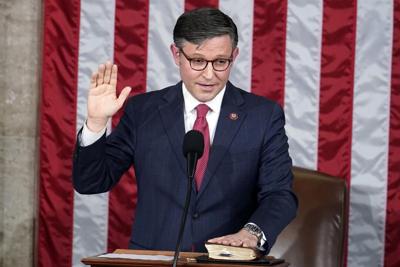When Mike Johnson, of Benton, took the gavel and made his first speech to the chamber he now leads as House Speaker, he struck just the right tone.
Johnson talked of the enormity of the moment and vowed to seek common ground with Democratic Leader Hakeem Jeffries on behalf of the country he said they both love. He earned several hearty ovations from both sides of the aisle, which seemed unimaginable during the ugly three weeks of Republicans eating their own.
The evening before, the scene was very different.
Fresh off the internal party vote nominating the little-known Johnson for speaker — and with the relief of having finally settled on a leader all over their faces — House Republicans gathered to face the press.
Then came a question that they really should have seen coming, or at least the start of one: “Mr. Johnson, you helped lead the efforts to overturn the 2020 election results ...”
That’s as far as ABC’s Rachel Scott got before the assembled representatives shouted her down.
Watch closely, again, and it’s a deeply disturbing tableau — one that surely was the result of collective exhaustion but also reads like an unfiltered glimpse into what the people on camera really think.
Majority Leader Steve Scalise, of Jefferson, laughed. Far-right disrupter Lauren Boebert of Colorado, who joined Scalise and other recognizable leaders at Johnson’s side, booed heartily. Eighty-year-old Virginia Foxx of North Carolina yelled at Scott to “shut up.”
And Johnson, their new leader, shook his head, smiled a bit — or was it a snicker? — and said: “Next question.”
Well, here are some questions: Does Scalise, one of three more senior Republicans who failed to win the speakership, think the whole effort to overturn a free and fair election is funny? Was Boebert’s presence at Johnson’s left hand meant to send a signal, or did she worm her way into the camera shot on her own? Does Foxx behave so childishly when she’s chairing the Education Committee?
And the big one: Does Johnson actually think he can brush right past inquiries into his actions in late 2020 and early 2021 on former President Donald Trump’s behalf?
Because if Republicans like Scalise cynically enabled the dangerous conspiracies that fueled doubt into President Joe Biden’s win, Johnson was an actual instigator.
His most significant contribution to the cause was a legal theory challenging results in states where governors, secretaries of state or judges were involved in changing the rules to allow fuller voter participation during the pandemic.
Johnson rallied his colleagues to sign a friend of the court brief in a Texas suit asking the U.S. Supreme Court to invalidate results in four swing states that Joe Biden won, on the theory that only legislators could do so.
In an interview with The New Yorker, Johnson insisted that his underlying agenda was simple constitutional clarity, not mass disenfranchisement — which suggests he might have objected in every state where what he described happened, including Louisiana, not just Michigan, Wisconsin, Georgia and Pennsylvania. In the end, the conservative high court provided perfect clarity: It rejected the plea out of hand.
Johnson also told the magazine that his message to colleagues that Trump was “anxiously awaiting” a list of signers was not intended as a pressure tactic on behalf of a president known for keeping score and exacting retribution.
“I will take the fall for that,” Johnson said. Well, yeah.
The episode points to what appears to be Johnson’s special gift, one that contributed to his status as a consensus choice among warring factions: an ability to put a friendly and legalistic face on some extreme opinions.
It happened when he told Fox News’ Sean Hannity this week that he accepts the Supreme Court’s ruling that same-sex marriage is the law of the land, even though he has pushed legislation to create wide official license to discriminate against these couples, under the guise of religious freedom.
It’s there in his attitudes toward impeachment, his past defense of Trump’s appalling actions on Ukraine and Jan. 6, and his current support for the nakedly political inquiry into Biden, which a key GOP-aligned lawyer basically acknowledged as a witch hunt but which Johnson blithely predicted will “very likely” uncover evidence of impeachable offenses.
It was quite a feat to win unanimous GOP support, from the blow-everything-up caucus that deposed Kevin McCarthy (Matt Gaetz, the architect of McCarthy’s fall, has voiced delight at the outcome) to the representatives from districts that Biden won, who will now have to answer for everything Johnson has said and done — not only on the 2020 election and LGBTQ rights and impeachment but also abortion and Ukraine and guns.
Johnson’s agreeable demeanor, on top of the obvious fatigue of his caucus, took him this far, and it helped get him through that first speech as well as some apparently pleasant meetings with Biden and other national leaders.
Given the divisive times and Johnson’s own record, I predict we’re seeing only a brief cease-fire in the GOP’s civil war.

